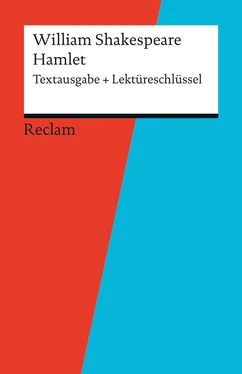REYNALDO. Ay, very well, my lord.
POLONIUS. “And in part him, but”, you may say, “not well,
But if’t be he I mean, he’s very wild,
Addictedso and so.” And there put onhim
What forgeriesyou please; marry, none so rank
As may dishonour him, take heed of that,
But, sir, such wanton, wild, and usual slips
As are companions noted and most known
To youth and liberty.
REYNALDO. As gaming, my lord.
POLONIUS. Ay, or drinking, fencing 1, swearing, quarrelling,
Drabbing– you may go so far.
REYNALDO. My lord, that would dishonour him.
POLONIUS. Faith, no, as you may seasonit in the charge.
You must not put anotherscandal on him,
That he is open to incontinency,
That’s not my meaning; but breathe his faults so quaintly
That they may seem the taintsof liberty,
The flashand outbreak of a fiery mind,
[57] A savagenessin unreclaimèdblood,
Of general assault.
REYNALDO. But, my good lord …
POLONIUS. Wherefore should you do this?
REYNALDO. Ay, my lord,
I would know that.
POLONIUS. Marry, sir, here’s my drift,
And I believe it is a fetch of warr’nt:
You laying these slight sullieson my son,
As ’twerea thing a little soiled wi’th’ working,
Mark you, your party in converse, himyou would sound,
Having everseen in the prenominatecrimes
The youth you breathe of guilty, be assured
He closes withyou in this consequence,
“Good sir” (or so), or “friend”, or “gentleman”,
According to the phrase or the addition
Of man and country.
REYNALDO. Very good, my lord.
POLONIUS. And then, sir, does ’a this, ’a does … what was I
[58] about to say? By the mass, I was about to say something.
Where did I leave?
REYNALDO. At “closes in the consequence”, at “friend, or so”, and “gentleman”.
POLONIUS. At “closes in the consequence” – ay, marry,
He closes thus, “I know the gentleman,
I saw him yesterday, or th’ other day,
Or then, or then, with such or such, and, as you say,
There was ’a gaming, there o’ertook in’s rouse,
There falling outat tennis”; or perchance,
“I saw him enter such a house of sale”,
Videliceta brothel, or so forth. See you now,
Your baitof falsehood takes this carpof truth,
And thus do we of wisdom and of reach,
With windlassesand with assays of bias 2,
By indirectionfind directions out;
So by my former lectureand advice
Shall you my son. You have me, have you not?
[59] REYNALDO. My lord, I have.
POLONIUS. God bye ye, fare ye well.
REYNALDO. Good my lord.
[Makes to go.]
POLONIUS. Observe his inclination in yourself.
REYNALDO. I shall, my lord.
[Again makes to go.]
POLONIUS. And let him ply his music.
REYNALDO. Well, my lord.
Exit.
POLONIUS. Farewell.
Enter Ophelia.
How now, Ophelia, what’s the matter?
OPHELIA. O my lord, my lord, I have been so affrighted!
POLONIUS. With what, i’th’ name of God?
OPHELIA. My lord, as I was sewing in my closet,
Lord Hamlet, with his doublet all unbraced,
No hat upon his head, 3his stockings fouled,
Ungartered and down-gyvèd to his ankle,
Pale as his shirt, his knees knocking each other,
And with a look so piteous in purport
[60] As if he had been loosèd out of hell
To speak of horrors … he comes before me.
POLONIUS. Mad for thy love? 4
OPHELIA. My lord, I do not know,
But truly I do fear it.
POLONIUS. What said he?
OPHELIA. He took me by the wrist, and held me hard,
Then goes he to the length of all his arm,
And with his other hand thus o’er his brow,
He falls to such perusal of my face
As ’a would draw it. Long stayed he so;
At last, a little shaking of mine arm,
And thrice his head thus waving up and down,
He raised a sigh so piteous and profound
As it did seem to shatter all his bulk
And end his being; that done, he lets me go,
And with his head over his shoulder turned,
He seemed to find his way without his eyes,
For out a’ doors he went without their help,
And to the last bended their light on me.
POLONIUS. Come, go with me, I will go seek the King.
This is the very ecstasy of love,
Whose violent property fordoes itself,
And leads the will to desperate undertakings
As oft as any passion under heaven
[61] That does afflict our natures. I am sorry –
What, have you given him any hard words of late?
OPHELIA. No, my good lord, but as you did command,
I did repel his letters, and denied
His access to me.
POLONIUS. That hath made him mad.
I am sorry that with better heed and judgement
I had not quoted him. I feared he did but trifle
And meant to wreck thee, but beshrew my jealousy!
By heaven, it is as proper to our age
To cast beyond ourselves in our opinions,
As it is common for the younger sort
To lack discretion. Come, go we to the King.
This must be known, which, being kept close, might move
More grief to hide than hate to utter love.
Come.
Exeunt.
[62] Scene 2
[The audience chamber, giving on to the lobby.]
Flourish; enter King, Queen, Rosencrantz, Guildenstern, and Attendants.
KING. Welcome, dear Rosencrantz and Guildenstern!
Moreover that we much did long to see you,
The need we have to use you did provoke
Our hasty sending. Something have you heard
Of Hamlet’s transformation – so I call it,
Sith nor th’ exterior nor the inward man
Resembles that it was. What it should be,
More than his father’s death, that thus hath put him
So much from th’ understanding of himself,
I cannot dream of. I entreat you both,
That, being of so young days brought up with him,
And sith so neighboured to his youth and haviour,
That you vouchsafe your rest here in our court
Some little time, so by your companies
To draw him on to pleasures, and to gather,
[63] So much as from occasion you may glean,
Whether aught to us unknown afflicts him thus
That, opened, lies within our remedy.
QUEEN. Good gentlemen, he hath much talked of you,
And sure I am, two men there is not living
To whom he more adheres. If it will please you
To show us so much gentry and good will
As to expend your time with us awhile
For the supply and profit of our hope,
Your visitation shall receive such thanks
As fits a king’s remembrance.
ROSENCRANTZ. Both your Majesties
Might, by the sovereign power you have of us,
Put your dread pleasures more into command
Than to entreaty.
GUILDENSTERN. But we both obey,
And here give up ourselves in the full bent
To lay our service freely at your feet
To be commanded.
KING. Thanks Rosencrantz, and gentle Guildenstern.
QUEEN. Thanks Guildenstern, and gentle Rosencrantz,
And I beseech you instantly to visit
[64] My too much changèd son. – Go, some of you,
And bring these gentlemen where Hamlet is.
GUILDENSTERN. Heavens make our presence and our practices
Pleasant and helpful to him.
QUEEN. Ay, amen!
Exeunt Rosencrantz and Guildenstern with an Attendant.
Enter Polonius.
POLONIUS. Th’ ambassadors from Norway, my good lord,
[Draws the King aside.]
Are joyfully returned.
KING. Thou still hast been the father of good news.
POLONIUS. Have I, my lord? I assure you, my good liege,
I hold my duty as I hold my soul,
Both to my God and to my gracious King;
Читать дальше












